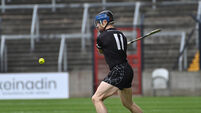Colm Bonnar deserved better treatment from Tipperary County Board

Tipperary manager Colm Bonnar during the Munster SHC game between Waterford and Tipperary at Walsh Park in April. Picture: Piaras Ó Mídheach/Sportsfile
When Tipperary won the 2016 All-Ireland SHC, it was manager Michael Ryan’s first year in charge.
The Upperchurch man hadn’t simply come in the door and got lucky, though – he had previously been a selector under Liam Sheedy from 2008-10, with Tipp winning the All-Ireland in the last of those years, while he was also part of Éamon O’Shea’s managerial team.
In the autumn of 2014, O’Shea decided that he would step down when his term expired at the end of the following season and Tipperary County Board made the unusual announcement that Ryan would be taking over from the 2016 campaign onwards.
It made logical sense in terms of avoiding a widespread change but, at the time, it wasn’t universally popular – a bit like how, a few years later, when the FAI said that Stephen Kenny would replace Mick McCarthy, there was a band of ‘What if Mick wins us 2020?’ dissenters. In the event, the Tipp decision was vindicated by how things turned out, even if Ryan’s first year in charge was the best of the three.
Last year, there was a situation not unlike the O’Shea/Ryan one but it was different in many ways. When Liam Cahill opted to remain as Waterford manager rather than taking over in his native Tipp following the departure of Liam Sheedy, there was little doubt that he would be the next boss of the Premier County – but the question of when was uncertain, while obviously it wouldn’t be a continuity appointment.
With Cahill – manager of All-Ireland-winning Tipp minor teams in 2007 and 2016, the last U21 title in 2018 and the first U20 one in 2019 – made his call, the Tipp board turned to Colm Bonnar. He knew, along with everyone else, that he hadn’t been first choice and he probably felt that he had deserved a shot at it before then.
Equally, it was fairly clear that 2022 would be a year of transition for Tipp as the graduates of the U21/U20 victories hadn’t been integrated at senior to a huge degree. Still, Bonnar answered the call for a three-year term, acknowledging the size of the task.
It wasn’t a good year for Tipp, losing to Kerry in the Munster HL, a ho-hum league campaign and then four championship defeats – had Kerry beaten Antrim in the Joe McDonagh Cup final, Tipp would have had the ignominy of a play-off to remain in the Munster championship.
Still, players had been blooded and earned some championship experience, while the away games against Waterford and Limerick saw Tipp compete strongly for the guts of an hour. When he met the executive of the board for a review of the year, Bonnar gave an honest assessment and cited things to work on for 2023.
Instead, last Thursday brought a statement from the county board that the Cashel native had been “relieved of his duties”. Then, on Friday, Cahill stepped down as Waterford boss - it is expected that he will be appointed as the next Tipp manager.
Given that county managers don’t have contracts of employment, terms are fairly meaningless – a manager can break his term, like Jack O’Connor in Kildare to go back to Kerry – without any repercussions and, similarly, a board can dispense with a manager and not have to worry about paying out a large wedge of compensation.
Still, there is a sense of honour to it. While Cahill ticks more boxes than any other candidate, especially after working with so many of the players at underage level, the Tipp board have not acted honourably towards Bonnar, who certainly didn’t take the job as part of an ego trip.
You can of course argue that, if the best man for the job was available – or about to become available – he should be installed and that nobody can wait for success. At the same time, a situation can be handled well or badly and the Tipperary County Board’s actions were in contrast to how well the Ryan ascension was taken care of eight years ago.
While Cahill may well prove to be a success, the way the episode plays out applies a layer of needless extra pressure when the job and the challenge are already fairly big.









 App?
App?







